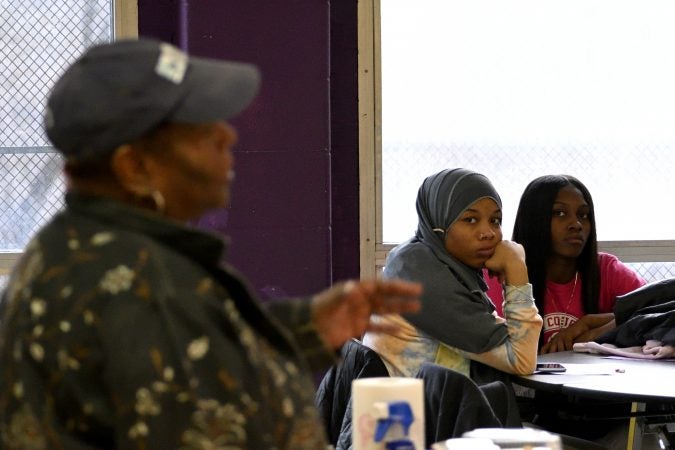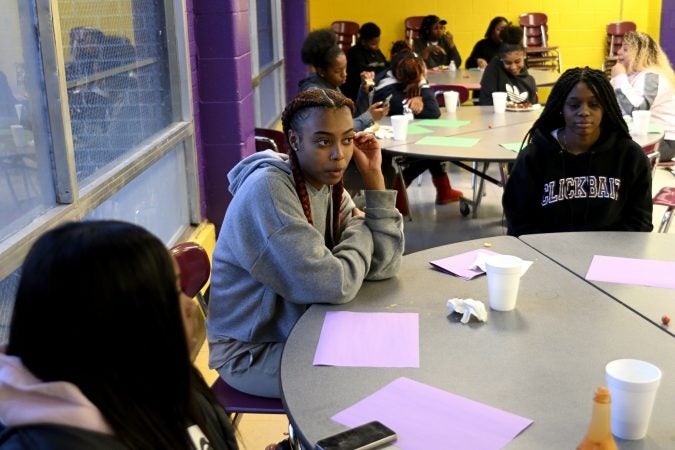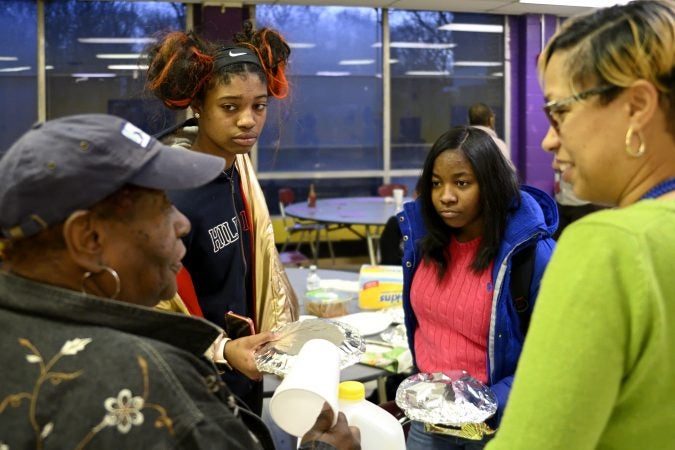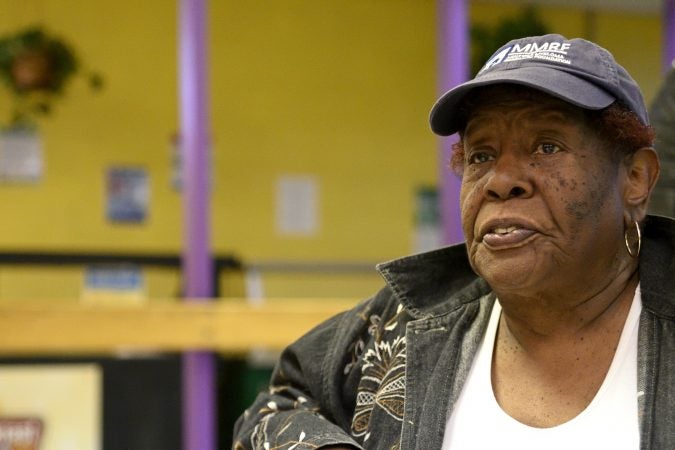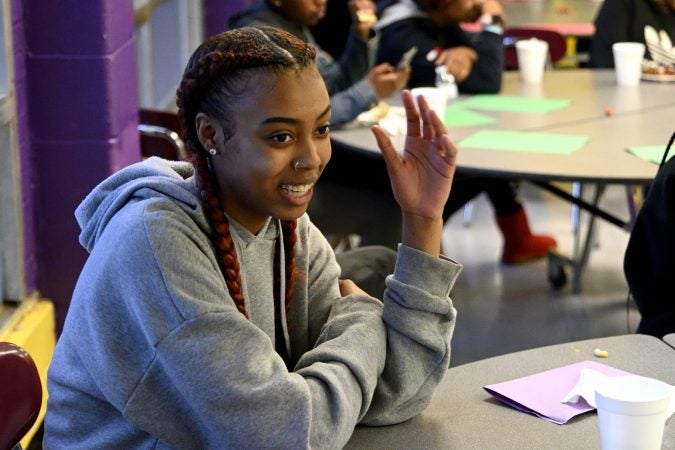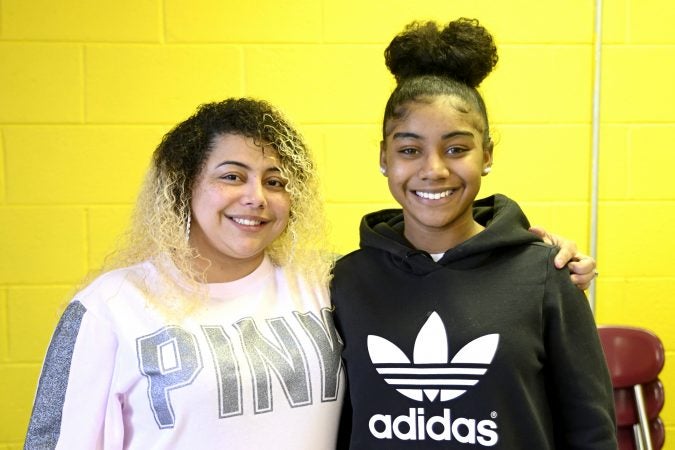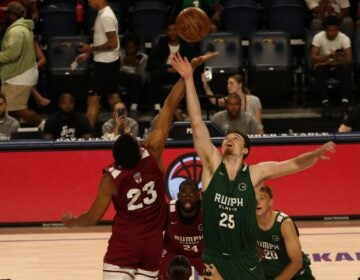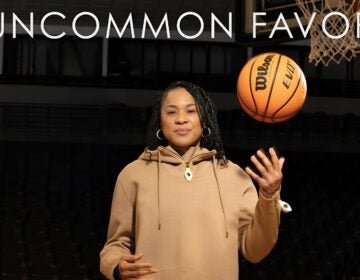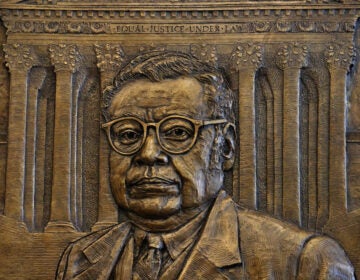Northwest Philly grandma, hidden civil rights hero still coaching and fighting
Lurline Jones is a legendary coach and local civil rights trailblazer. But why is the 75-year-old still coaching in the last place you’d expect?
Listen 6:16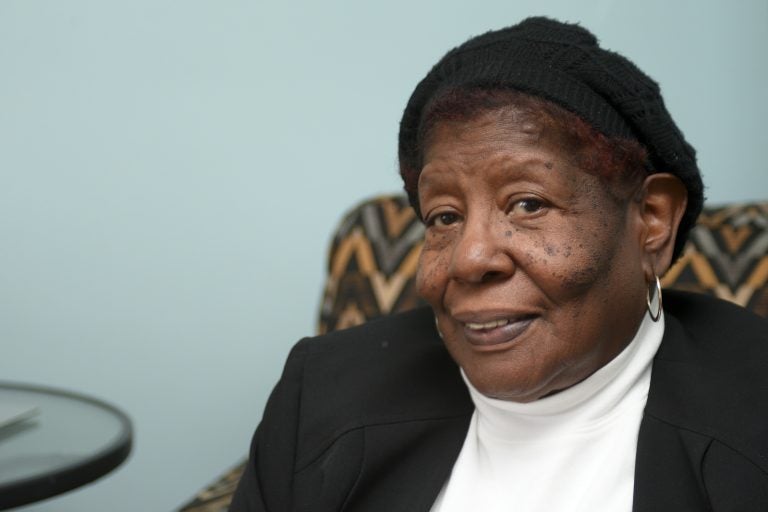
Lurline Jones, girls basketball coach, in her Mt Airy home, on February 13, 2019. (Bastiaan Slabbers for WHYY)
Earlier this month, the Martin Luther King High School girls basketball team gathered in the school cafeteria for an end-of-year banquet.
While buffet trays of soul food simmered on nearby tables, head coach Lurline Jones hoisted herself from a plastic chair and grabbed the microphone.
The Cougars lost all 16 of their games this season. Jones didn’t sugarcoat things — she never does.
“My team knows I care about ‘em,” she said. “They don’t like me sometimes ‘cause I holler at ‘em all the time. They talk all the time.”
It was a “kids-these-days” kind of speech, but the audience laughed along.
Jones turned 75 a couple weeks ago. Her team is young, even by high school standards. The 14-girl roster featured nine freshmen. Jones assessed their skills with characteristic bluntness.
“They’d never played basketball before,” she said to the parents and teachers assembled.
Jones has played and seen a lot of basketball. During her 33-year coaching career at University City High School in West Philadelphia, she won 647 games and 12 city championships.
Her players are vaguely aware of that track record.
“She a GOAT,” said 10th-grader and team MVP Amari Ward, using an acronym for greatest of all time. “She tough.”
The girls also know — with similar vagueness — about Jones’ accomplishments off the court.
“I know that a while ago she was in the civil rights movement,” said ninth-grader La’Kye Powell.
‘A fair shake’
She kind of still is, although her activism no longer garners headlines.
The girls basketball team at Martin Luther King High School in Philadelphia’s West Oak Lane section is about as far as you can get from the prep sports spotlight. But 40 years ago, Jones was squarely in the center of it.
If you understand how she got there, you’ll understand why she’s still on the sidelines — and still raising her voice for girl athletes in Philadelphia.
“I just want them to get a fair shake,” Jones said. “It’s not rocket science.”
Jones inherited an activist spirit from her mother, Mary Nixon, a domestic worker who grew up on the Eastern Shore of Maryland. Jones’ father died when she was 10, leaving Nixon to raise Jones alone in the Brewerytown section of North Philadelphia.
Nixon would take young Lurline to historic sites up and down the East Coast and teach her black history. She was the type person who, “if she felt things weren’t right, she would speak on it.”
Jones’ mother was old school, a devout Christian who banned alcohol in the house, and remained loyal to the Republican Party because it was “the party of Lincoln,” Jones said.
But she placed no limits on her daughter’s aspirations.
“I could be anything I wanted to be,” Jones said.
An activist, and a coach is born
Jones came to sports by accident. When she returned home from school each day, her mother would ask her to help clean the house. Jones didn’t want to clean the house, so she threw herself into whatever after-school activities she could find at William Penn High School for Girls.
That included a nascent form of girls basketball. Players wore skirts and had to remain on one side of half court or the other to discourage excessive running. Varsity leagues for girls didn’t exist, Jones said. It was “official, unofficial,” with girls teams organizing their own inter-school competitions.
Jones left for Baltimore’s Morgan College (now Morgan State) in the early 1960s, where her basketball career continued. She also came face-to-face with legal segregation for the first time, and was swept up in the civil rights movement. In 1963, she and hundreds of other Morgan College students spent nearly a week in jail after protesting the segregation policy at a nearby movie theater.
Jones returned to Philadelphia after getting her degree, and eventually landed a job at West Philadelphia’s University City High School when it opened in the early 1970s.
Almost by default, Jones became the school’s girls basketball coach. In their first season, the Jaguars went 0-13. And it wasn’t a misleading 0-13.
“They were beating us by a hundred points,” Jones recalled.
She vowed it wouldn’t happen again.
Jones decided to bone up on coaching strategy. She’d sit in the bleachers and watch legendary coaches like Temple’s John Chaney and Cheyney State’s Vivian Stringer run practices. Then she’d run the same drills with her girls.
Jones also started mining local middle schools for talent. She used University City’s new facilities — and in particular its air conditioning — as recruitment bait.
“I said we’re coool,” Jones recalled. “On them hot days, you don’t have to worry about it.”
Jones and the Jaguars started cooking on the court. The team won consecutive public league championships in 1978 and 1979.
That’s when Jones hit a career-defining crossroads.
Invoking Title IX
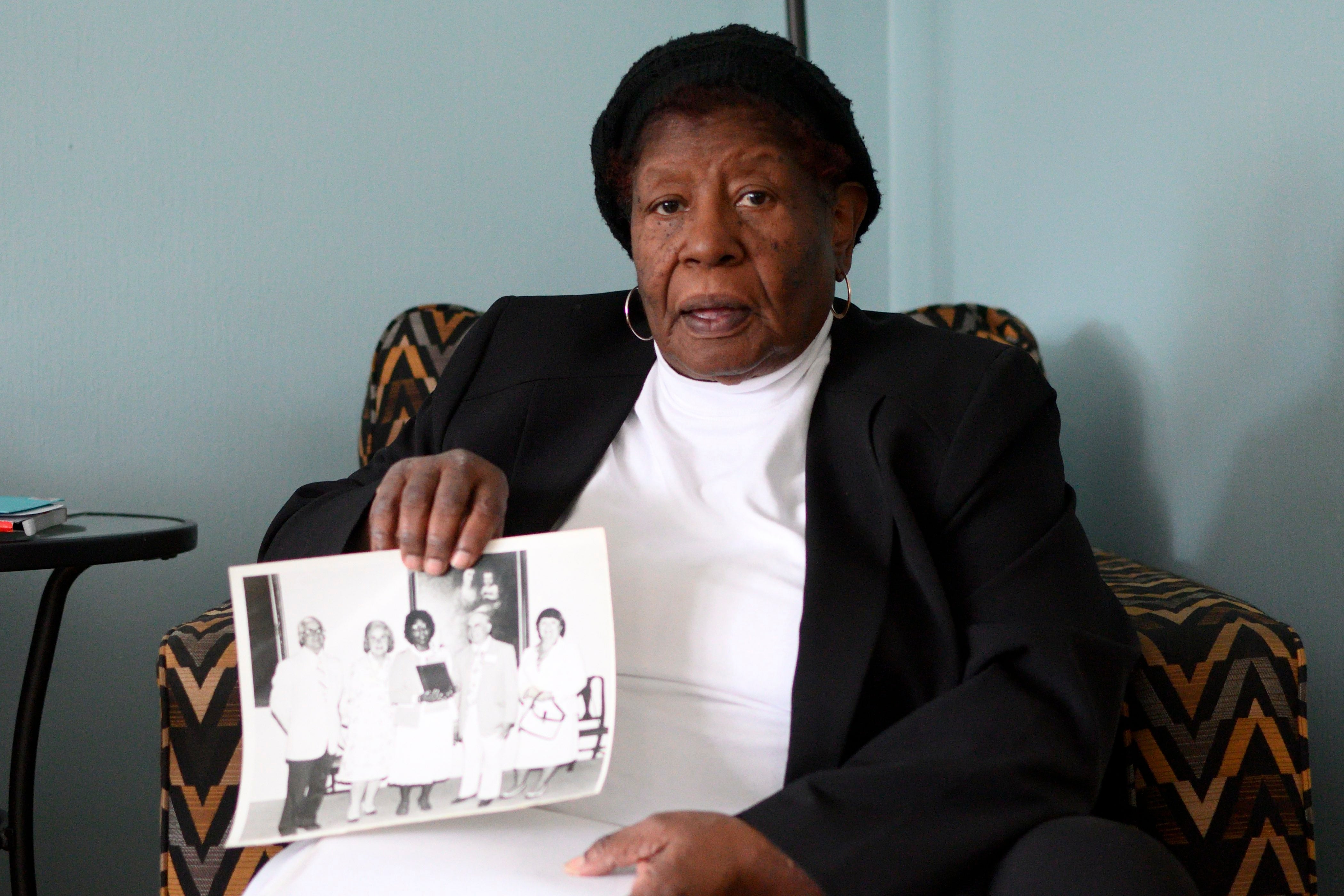
Back then, the public league champions in every major boys sport would play the Catholic league champions in what was termed the city title game. The tradition stretched back to the 1930s, drawing thousands to Franklin Field for football games and the Palestra for basketball contests.
No such game existed for girls teams.
Jones says the inequity bothered her players, especially Yolanda Laney, the star of her first championship team. Laney pestered her with questions.
“Yolanda kept saying, ‘Why can’t we play?’” Jones recalled. “I said, I don’t know, Yolanda, but I sure will find out.”
Jones started researching. She found out a relatively new federal law called Title IX barred discrimination on the basis of sex. The absence of a city title game for girls seemed like a violation.
On an October afternoon in 1979, Jones walked across the street from her high school — into a federal building — and filed an administrative complaint under Title IX.
“Against the same school district that gave me a check every two weeks,” Jones said. “I had to be out of my mind.”
Jones also became the lead plaintiff in a civil rights lawsuit against the school district and the Archdiocese of Philadelphia. Advocates saw the case as an opportunity to highlight broader disparities in boys and girls athletics.
But rather than fight the lawsuit to its bitter end — or simply create a girls title game — the Archdiocese of Philadelphia went nuclear. It withdrew from the city title series, effectively canceling it for girls and boys.
The decision shocked many, including Linda Greene, who took on the case as a young law professor at Temple University. She’d seen resistance tactics like this while bringing civil rights cases in the South.
“[But] I was not expecting that kind of reaction in Philadelphia,” said Greene. “I was not expecting that in Philadelphia.”
In the winter of 1980, Overbrook High School beat Roman Catholic in an overtime thriller. Then the city title series went dark.
Jones became, in her words, a “pariah.” She received insults and even threats.
She kept coaching, though, and racking up wins. Eventually, accolades followed.
The city title game never truly came back.
Doing the right thing
Ten years ago Catholic and public league teams began to meet regularly again in post-season play after the Catholic schools joined Pennsylvania’s statewide athletic association.
There’s no be-all-end-all championship, but there’s some measure of closure. And yes, today’s post-season tilts include boys and girls.
“It’s not so much a victory as it is the right thing to do,” said Jones with an impatient crescendo. “It’s the RIGHT. THING. TO DO.”
Ask Jones to reflect on the legacy of her lawsuit, and these are the kind of answers you get.
It’s not complicated, she’ll tell you. She saw something wrong and she spoke on it. Just like her mother used to do.
It’s like she’s describing a moral metronome, something inside her that clicks constantly, involuntarily.
Women’s basketball has changed a lot since Jones played basketball at William Penn High School. There’s more running. Fewer skirts. Some of Jones’s former players have gone pro. Yolanda Laney’s daughter plays in the WNBA.
But Jones isn’t wired to see the progress. She’ll still tell anyone in earshot that girl athletes don’t get the respect or resources they deserve.
When the new Philadelphia school board held a listening tour, Jones showed up and told them to keep on eye on athletic inequality. When the board held its first public meeting, she showed up again with the same message.
Jones won’t pat herself on the back — even if you try really hard to show her how far girls sports of come in her lifetime.
“No. Nah. That’s really not me,” she said with mounting frustration. “I keep telling you and I say this 10 TIMES. Just do the right thing. Just do the right thing.”
Goal tending
Jones just keeps doing what she does. She agitates for equal treatment. And she coaches.
She retired from University City in 2007 and the school named its gym after her a few years later. The district closed University City in 2013 and later demolished it.
Jones came out of retirement to coach three seasons at Germantown High School. The district closed that school, too, and sold the building to developers.
Schools come and go in Philadelphia. Jones remains.
This season the principal at Martin Luther King High asked if she’d come back to the sidelines. Why’d she say yes? As always, Jones makes it seem simple.
“I love coaching,” she said. “I love teaching.”
By her count, Jones has sent more than 300 girls to college with athletic scholarships. She rarely glows, but when she does, it’s often about her girls. They’ve become lawyers, doctors, bank managers, and, yes, coaches.
Denique Graves was a 6’3” coil of raw talent when a neighborhood leader recommended she play high school ball for Coach Jones. Graves wanted to study dance at the city’s magnet school for performing arts, but Jones convinced Graves’ mother that basketball was her ticket to college.
Graves stepped into the halls of University City in 1989 with only the foggiest idea of how to play organized basketball. She didn’t know where or what the free-throw line was.
Four years later she starred at Howard University, which led to a short stint in the WNBA and many more years playing abroad. She’s since returned to the Philly area and just last week accepted a position as the head girls basketball coach at Charter High School for Architecture and Design in Center City.
Coach Jones is now one of her peers, and Graves hopes someday to have sent just as many girls to college.
“It’s coming full circle,” said Graves on Sunday from her home in New Jersey. “I’m about to call her now.”
Jones has come full circle, too. She’s back where she started: a fledgling team at a public high school in Philadelphia.
It’s hard to imagine her anywhere else.
WHYY is your source for fact-based, in-depth journalism and information. As a nonprofit organization, we rely on financial support from readers like you. Please give today.



